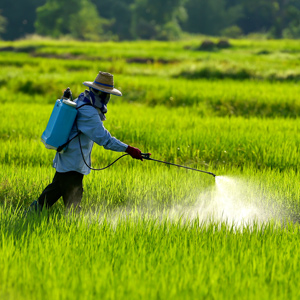 Repairing equipment used to apply pesticides is one way that farmers may experience high pesticide exposure events.
Repairing equipment used to apply pesticides is one way that farmers may experience high pesticide exposure events.The sense of smell is important. It allows you to experience pleasurable aromas, such as just-baked bread or a rose, and it can save your life by alerting you to a gas leak or smoke from a fire. But loss of sense of smell is common in people as they age, as well as in those with Parkinson’s and Alzheimer’s diseases.
Environmental exposures may also contribute to the loss of sense of smell. According to a study published Jan. 16 in Environmental Health Perspectives, farmers in the Agricultural Health Study (AHS) who reported experiencing a high pesticide exposure event (HPEE), such as getting a large amount on their skin, were more likely to have a loss of sense of smell approximately two decades later.
Researchers want to do more studies to identify other causes and to determine if loss of sense of smell due to HPEEs and neurodegenerative conditions arise from the same neurological damage.
Impairment of smell
Scientists asked 11,232 farmers during AHS enrollment if they had at least one HPEE, and approximately 16 percent reported that they had. Researchers asked the farmers twenty years later whether they had experienced a loss of smell.
 During his time at NIEHS, Chen headed the Aging and Neuroepidemiology Group. (Photo courtesy of Steve McCaw)
During his time at NIEHS, Chen headed the Aging and Neuroepidemiology Group. (Photo courtesy of Steve McCaw)Those who had experienced an HPEE were nearly 50 percent more likely to report loss of sense of smell compared with farmers who did not report an HPEE. The study also found that farmers who had an HPEE and waited four or more hours to wash away the pesticide had a two-fold higher risk of a loss of sense of smell compared with farmers who had not experienced an HPEE.
'The study not only suggests that unusually high exposures to pesticides may contribute to poor sense of smell among older farmers, but it also suggests that a quick clean up with soap and water might mitigate the risk,' said Honglei Chen, MD., Ph.D., from Michigan State University in East Lansing. Chen, who served as corresponding author and led the study, first became involved in AHS research as a member of the NIEHS Epidemiology Branch.
Simple approach
Senior author Dale Sandler, Ph.D., chief of the NIEHS Epidemiology Branch, said team members tried to account for the role of specific pesticides involved in the HPEEs, but the small sample size made that difficult.
 'We focused on these high pesticide exposure events because they mimic the higher short-term exposures of animal studies and represent situations that could lead to pesticide poisoning,' Sandler said. (Photo courtesy of Steve McCaw)
'We focused on these high pesticide exposure events because they mimic the higher short-term exposures of animal studies and represent situations that could lead to pesticide poisoning,' Sandler said. (Photo courtesy of Steve McCaw)However, they did find six substances more likely to be associated with the loss of sense of smell — the organochlorine pesticides DDT and lindane, and herbicides alachlor, metolachlor, 2,4-D, and pendimethalin.
'We don’t know what causes loss of sense of smell, but evidence from case reports and some animal studies suggests that pesticides could play a role,' Sandler said. 'This observation provided the justification for us to take the next step.' (See sidebar.)
Citation: Shrestha S, Kamel F, Umbach DM, Beane Freeman LE, Koutros S, Alavanja M, Blair A, Sandler DP, Chen H. 2019. High pesticide exposure events and olfactory impairment among U.S. farmers. Environ Health Perspect 127(1):17005.









